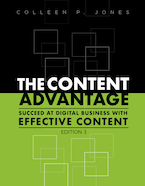
Thousands of technologies are now available to make planning, creating, delivering, and maintaining content faster and easier than ever before.
But many organizations lack a strategy for a content technology stack. Developing one should be a top priority. Doing so will not only help you improve your content operation now, but also will set up your team for future success.
“I have no doubt technology will be able to do much more for content in the future,” says Colleen Jones, founder, Content Science. “No matter what those technology capabilities are, companies that view content as a system will be better able to accommodate the machine capabilities and shift the roles of people to make the most of those capabilities.”
Types of Content Technologies
Content technology is no longer just about content management. Below is a sample of the types available today.
- Traditional content management systems (e.g., Adobe Experience Manager, Sitecore)
- Open source content management systems (e.g., Drupal, WordPress)
- Headless content management systems (e.g., Contentful)
- Content operations tools (e.g. GatherContent, MarketMuse)
- Content quality + standard alignment tools (e.g. Acrolinx, SiteImprove)
- Content intelligence + effectiveness tools (e.g. ContentWRX Effectiveness)
- Content marketing platforms (e.g., Contently, Hubspot)
- Content creation automated by generative AI (e.g., Writer, ChatGPT)
For a robust list of content technologies, check out Content Technology: An In-Depth Guide.
Trends
There’s more content technology available today than ever before, and its role inside companies has matured.
Companies are creating content technology stack strategies. “How do you manage this complex [technology] reality? Develop a strategy for your content technology stack.” — Colleen Jones, Advanced Content Marketing on LinkedIn Learning
How to think about adopting new tech into your stack. “Closely considering the purpose of the technology, what it’s going to do as part of your stack, is an important element of this journey in selecting content technology. So if you set the right expectations with the stakeholders involved upfront, the whole process is going to be a lot easier for you.” — Colleen Jones, Top Tips for Selecting Content Technology Webinar
Cognitive marketing is fueled by technology. Cognitive marketing is much easier to do now due to the technology at your fingertips, with advances in artificial intelligence (AI) making it simple to analyze data collected online to highlight the target audience and see what issues will resonate with customers the best. — Insights for Professionals
Marketing automation reaches new benchmarks. About 25% of participants reported being unaware of marketing automation technology being used, if any, indicating they’re not working in close alignment with marketing. Of those using the technology, the use is widely distributed among solutions. — What Makes Content Operations Successful?
CMS is evolving, helping brands to scale content and cover more devices and touchpoints. In 2022, the number of websites using a CMS rose to 67%. (Tech Jury) More companies realize the importance of having a dedicated content management system to stay competitive. Using a CMS that fulfills and adapts to all your needs is a valuable organizational tool that yields dividends for all stakeholders and promotes a great customer experience. — A Modern Guide to Selecting a CMS
Content intelligence and artificial intelligence. Artificial intelligence assists content intelligence by measuring content effectiveness, assess the alignment of content with standard automatically, automating optimization of content for best performance. — Artificial Intelligence and Content
CEOs see the benefits of incorporating advanced technologies. Over 80% of CEOs consider artificial intelligence and machine learning either “very important” or “extremely important” to the future of the company. — Colleen Jones, The Content Advantage
Uses and Benefits
Although companies see the benefits of content technology, they lack a clear strategy for incorporating these technologies into their day-to-day operations. Advanced technologies like artificial intelligence and machine learning help companies personalize content and achieve their content goals.
Artificial intelligence helps scale content operations. “AI and machine learning is the only way we’re going to be able to deal with the fact that the demand for content is increasing exponentially. We’re going to have to automate the production of certain aspects of content.” — Noel McDonagh, The Content Advantage
Automation and streamlining frees up bandwidth to focus on big wins. “There’s a real opportunity cost to not being able to iteratively improve content. There’s also a real opportunity cost with not being able to innovate. You’re really going to be hampered in your ability to innovate if you’re bogged down in maintenance.” — Colleen Jones, Content Insiders
Technology helps companies scale content operations. As your content program scales, technology will be especially helpful in three areas: content operations, content intelligence, and content delivery. — Colleen Jones, Introduction to Content Marketing on LinkedIn Learning
Effective technology supports content personalization. “We have found that organizations reporting to be very successful with content are more than twice as likely to offer personalized content experiences. And, of course, that usually involves having strong support from the technology side.” — Colleen Jones, Top Tips for Selecting Content Technology Webinar
Technology measures data and facilitates a truly personalized experience. Creating personalized messages and experiences requires intimate knowledge of customer journeys, relevant content that drives action, and technology that helps deliver and measure experiences. Brands need to be extremely thoughtful in how they personalize their content today…focus on showing customers you can help them first. – Gartner, Rethinking Personalization for Maximum Impact
A headless CMS facilitates effective omnichannel delivery. A headless CMS is a back end-only content management system where the “body” content is stored separately from the “head,” where it is presented. Content can more easily be reused across web, mobile and other platforms by keeping the content on the backend disconnected from the front end. — 13 Headless CMS to Put On Your Radar
Lack of technology can prevent maturity. 20% of respondents report their technology is not sufficient to handle the complexity of their content strategy. 9% report IT bottlenecks are preventing content maturity, and less than 10% report their technology is not core to content — What Makes Content Operations Successful?
Power comes from marketing and IT working together, with the CMT as a liaison. The CMT collaborates closely with marketing teams, IT departments, and other stakeholders to create cohesive marketing strategies that leverage the full potential of available technology. By understanding the organization’s business goals, target audience, and competitive landscape, the CMT ensures that marketing technology is utilized effectively to deliver personalized and engaging experiences to customers. — Lxahub
Technology Use Stats
Knowing what other companies are doing is key to staying competitive, especially with technology adoption. Understanding technology usage trends informs your decision making and can help you determine what technologies are most effective for your needs.
Many companies have begun considering, researching, or adopting AI. 73% of companies have “started on the path to AI.” — Deloitte Global Intelligent Automation Survey
Changes in how organizations use content management technology. Organizations use a diverse set of tools to manage content from content management systems to web content management to content marketing platforms. The percentage using open-source CMSs like WordPress or Drupal is down by 52%. — What Makes Content Operations Successful?
More companies are adopting a headless CMS. 64% of enterprise organizations are currently using a headless approach—up nearly 25% from 2019. 92% of respondents see the importance of digital experiences in terms of their organization’s success. 92% of respondents say headless technologies make it easier to deliver a consistent content experience across channels. — WP Engine
AI tools are assisting marketing and content efforts. 26% of marketers say AI and machine learning helped them improve or optimize their content. — Statista
Content planning tools are becoming more popular. In a survey, 76% said that they use tools for calendaring, collaboration or workflow in their content marketing activities. — Sprout Social
Bottom Line
Content technology is evolving and improving at a rapid rate. Companies that are ready to take advantage of these tools and systems are seeing more success. They can get and keep their staff on the same page more quickly, produce higher quality content more efficiently, and develop messaging that meets their customers where they are more effectively. To accelerate content technology adoption at your organization, consider these technologies and tools for planning, creating, delivering, and evaluating your content.
Events, Resources, + More
The Ultimate Guide to End-to-End Content
Discover why + how an end-to-end approach is critical in the age of AI with this comprehensive white paper.
The Content Advantage Book
The much-anticipated third edition of the highly rated book by Colleen Jones is available at book retailers worldwide. Learn more!
20 Signs of a Content Problem in a High-Stakes Initiative
Use this white paper to diagnose the problem so you can achieve the right solution faster.
Upskill with Content Science Academy
Training for modern content roles through on-demand certifications + courses or live workshops.






Comments
We invite you to share your perspective in a constructive way. To comment, please sign in or register. Our moderating team will review all comments and may edit them for clarity. Our team also may delete comments that are off-topic or disrespectful. All postings become the property of
Content Science Review.